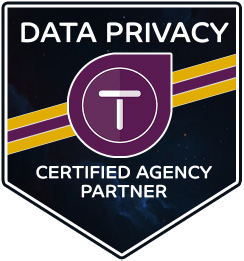Website Policies
The importance of website policies*
An explanation of the three most common policies found on websites, what website policies are, how they help you comply with laws and how they protect you by limiting your liability.
Privacy Policy
What is a Privacy Policy?
A Privacy Policy helps website owners comply with privacy laws by providing specific disclosure requirements such as how their website collects, uses, and discloses personally identifiable information and more.
A comprehensive Privacy Policy is required to comply with privacy laws
Today’s modern websites are built to provide a great user experience and motivate prospective customers to reach out and inquire about what you have to offer. This is done through the use of tools such as contact forms, website analytics, and more.
Contact forms ask users to submit their ‘name’ and ‘email’, which are examples of personally identifiable information. When a website uses analytics, it collects each visitor’s IP address and shares that personally identifiable information with third-party data analytics providers. These are just a few examples of the many ways websites collect and share personally identifiable information.
Penalties for non-compliance
The collection of personally identifiable information is regulated under multiple privacy laws. For example, in the US, there are four state privacy laws that can apply to businesses, regardless of their location, and fines for non-compliance start at $2,500 per “infringement” (per website visitor). Each of these privacy laws has specific disclosure requirements that have to be added to your Privacy Policy to be compliant.
On top of that, over two dozen privacy bills have been proposed on a state-level, each with their own unique disclosure requirements and penalties for not complying. Some of these bills will enable citizens to sue businesses (of any size or location) for collecting their personally identifiable information without an up to date and compliant Privacy Policy. Due to the ever-changing nature of privacy laws, we recommend that you not only have a comprehensive Privacy Policy in place but that you also develop a strategy to keep your policies up to date when these laws are amended or when new laws are implemented.
Google requires your website to have a Privacy Policy
Outside of the legal requirements, Privacy Policies are required to use popular third-party tools. For example, a website utilizing Google Analytics is required by Google to have a Privacy Policy. You can find this requirement within section 7 of Google’s Terms of Service: https://marketingplatform.google.com/about/analytics/terms/us/
Privacy Policy Example
Terms of Service
What is a Terms of Service Agreement?
A Terms of Service Agreement limits the liability of businesses by stating the rules to using the website.
Example disclosures
Third-party links: When a website offers links to third-party websites, a Terms of Service can help explain to users that the business is not responsible if a user clicks those links. So, if a third-party link brings a user to a hacked website, the Terms of Service disclosure can help prevent you from being sued.
DMCA Notice: A Terms of Service agreement can also provide what’s called a DMCA notice, which helps prevent a business from being sued by providing contact information in case the website is accidentally using copyrighted material (like images or content).
There are many additional disclosures that a Terms of Service can make, but these two are the most popular and are easy ways to protect your website and your business.
Terms of Service (ToS) Agreement Example
Click here to see Desert Wing Design’s ‘Terms of Service Agreement’.
Disclaimer
What is a Disclaimer?
A Disclaimer is a document that helps limit your responsibilities and liabilities for your website in certain circumstances.
Does your website:
Advertise third-party products or services? A Disclaimer will help you protect yourself if a user clicks on the third-party advertisement and gets a virus, is somehow injured by the product or service, or is not happy with the third-party product or service
Sell or display health products? A Disclaimer will help you protect yourself in this case if the health products do not work as they should, do not deliver the results that were expected or if the user gets injured by the health products.
Participate in an affiliate program? An affiliate program is a program whereby you list a particular link on your website and, if the user clicks on that link or purchases the products that the link displays, you receive money from the manufacturer of that product. A Disclaimer will help you comply with the affiliate program’s Terms of Service as most affiliate programs require you to provide a Disclaimer and will help you keep your user’s trust.
Provide health and fitness advice? A Disclaimer will protect you in case the user gets injured after following your health and fitness advice, much like the beginning of those exercise videos that you will watch in January of next year.
Provide information that could be seen by others as legal advice? A Disclaimer will protect you by stating that there is no attorney client relationship here and that this advice is not legal advice, thus protecting you in case something goes wrong.
Disclaimer Example
How to obtain website policies
If you have the budget, we recommend hiring a lawyer that focuses on privacy law to write your website policies, monitor privacy laws, and update your policies when the laws change or when new laws go into effect. If you do not have the budget to hire a privacy lawyer for your website policies, we recommend using Termageddon.
Termageddon is a comprehensive website policies generator and will update your policies when privacy laws change or new privacy laws go into effect, helping you stay compliant and avoid privacy related fines and lawsuits, and they do it at a fraction of the cost of a lawyer. Although Termageddon is a technology company (not a legal services provider), it was founded by a privacy and contracts lawyer and the tool has been recognized as a trusted tech vendor by the largest international privacy organization in the world (iapp.org).
If Termageddon sounds like a good solution for your business, the license costs $99/year, and we charge a one-time setup fee of $50 per policy to create each page, add each link to a footer menu and test that each policy is displayed on your live site. You will have full access to your policies with your own Termageddon account, and you will be notified when new laws go into effect and when your policies are being updated or when new disclosures require additional questions that need to be answered.
Adding policies to your website is a decision you will have to make. We ask every client to review and sign our ‘Website Policies Waiver’ to confirm that they have received our notice on the legal requirements of Privacy Policies and the additional protections of Terms of Service and Disclaimer agreements.
General FAQs
You are collecting personal information on your website if you have a contact form that asks for the user’s name, email, or phone number. Also, you’re collecting personal information if you ask for the user’s email to sign them up for an email newsletter.
While technically you could write these policies yourself, we do not recommend that you do so. There are a lot of laws, cases and legal opinions on how to write these policies correctly. If you have not spent years studying law and cases, it is very likely that the policy you write would be incomplete, incorrect and non-compliant. Also, there are currently a lot of new privacy laws that are being proposed and passed, meaning that you’d have to constantly stay up to date with these laws and amend your Privacy Policy yourself every time. This would take a lot of time and effort on your part and would take you away from your actual business. That’s why we recommend Termageddon – they take care of all of this for you and automatically update your policies so that you do not have to worry about them.
If you have a data privacy attorney on staff, you should definitely ask him or her to write this up for you. Just as a heads up, if you want to ask your outside attorney to draft these for you, that’s a great idea but it may be a bit pricey. Also, lawyers that do not work in the privacy field often use Termageddon as the solution for their Privacy Policies so that’s something to think about as well.
Some of the laws that are being proposed or passed do not limit enforcement and liability to large companies only so your small business could be liable as well. Also, consumers do not distinguish between small and large businesses when it comes to protecting their privacy and are less likely to buy from companies that do not respect their privacy.
Using a template that you found online is definitely tempting, especially since there are so many free ones out there. However, when you use a template, you can’t be sure who wrote it so you don’t know whether it’s correct or even compliant with the legal requirements. Also, a template does not automatically update, meaning that you’ll have to keep track of all of the constantly changing laws, which I’m going to guess is something that you don’t have time for. It’s best to use a proven policy generator such as Termageddon because they automatically update the policies for you.
Privacy Policy FAQs
Yes. Since you are collecting personal information (e.g. name and email on your contact form), you are required to have a Privacy Policy. Currently, the following laws require Privacy Policies for most websites:
- General Data Protection Regulation (GDPR)
- UK Data Protection Act 2018
- California Online Privacy and Protection Act of 2003 (CalOPPA)
- California Privacy Protection Act (CCPA)
- Personal Information Protection and Electronic Documents Act (PIPEDA)
- Delaware Online Privacy and Protection Act (DOPPA)
- Nevada Revised Statutes Chapter 603A
There are also about a dozen other states that are proposing their own privacy laws that would require most businesses to have a Privacy Policy and would affect how that Privacy Policy is written, requiring you to make changes on a pretty regular basis.
The laws that are in place and that are proposed protect the residents of that state, not the businesses. As you know, people from California aren’t just going to websites of businesses located in California, they go to websites all over the United States. This means that you need a Privacy Policy if you collect personal information on your website, regardless of where you are physically located.
While having a secure site is awesome, it’s not related to the need to have a Privacy Policy. You need to have a Privacy Policy if you collect personal information on your website, regardless of how secure that personal information is once it’s given to you.
You could try and copy and paste someone else’s Privacy Policy, rewrite it to fit your website and then paste it onto your website. However, by doing so, you’d be committing copyright infringement, which could get you sued. Also, you don’t know whether that policy is compliant with the current laws and it won’t auto-update for you, meaning that you’ll have to keep track of the changes to the law which are increasing. Having Termageddon generate a policy for you is much easier, less time consuming and safer.
Terms of Service FAQ
Terms of Service is a great way to answer frequently asked customer questions and protect yourself from liability.
Terms of Service provides the following:
- If you sell products and services, it provides information on refunds, order cancellations and returns. This will help answer customer questions and will take them further down the path to actually buying;
- It will protect your intellectual property by making sure that everyone who goes onto your website knows that your logo, name, etc. are yours; and
- If you have links to third party sites on your website (e.g. social media links), it will help protect you in case the user gets a virus from that third party site.
Disclaimer FAQs
A Disclaimer is a document that helps limit your responsibilities and liabilities for your website in certain circumstances.
You need a Disclaimer if you do any of the following on your website:
- Display advertisements;
- Display or sell health products (e.g. vitamins and supplements);
- Participate in affiliate programs (e.g. Amazon Affiliates);
- Provide health and fitness advice or tips; or
- Provide any information or tips that could be seen as legal advice.
If you do any of the above, the Disclaimer will help you provide required disclosures, participate in affiliate programs (some programs require you to have a Disclaimer to participate) and will reduce your liability in case something goes wrong.
Does your website:
- Advertise third-party products or services? A Disclaimer will help you protect yourself if a user clicks on the third-party advertisement and gets a virus, is somehow injured by the product or service, or is not happy with the third-party product or service
- Sell or display health products? A Disclaimer will help you protect yourself in this case if the health products do not work as they should, do not deliver the results that were expected or if the user gets injured by the health products.
- Participate in an affiliate program? An affiliate program is a program whereby you list a particular link on your website and, if the user clicks on that link or purchases the products that the link displays, you receive money from the manufacturer of that product. A Disclaimer will help you comply with the affiliate program’s Terms of Service as most affiliate programs require you to provide a Disclaimer and will help you keep your user’s trust.
- Provide health and fitness advice? A Disclaimer will protect you in case the user gets injured after following your health and fitness advice, much like the beginning of those exercise videos that you will watch in January of next year.
- Provide information that could be seen by others as legal advice? A Disclaimer will protect you here by stating that there is no attorney client relationship here and that this advice is not legal advice, thus protecting you in case something goes wrong.
End User License Agreement FAQ
You need an End User License Agreement if you are licensing software that a user can download.
An End User License Agreement will help you with the following:
- Limit your liability in case a user gets a virus or is otherwise injured by using your software;
- Help protect your income stream by making it clear that the software license may not be shared with others; and
- Protect your intellectual property by making sure that the user knows that he or she is not allowed to reverse engineer or otherwise copy your software.
Termageddon FAQs
If you have the budget, we recommend hiring a lawyer that focuses on privacy law to write your website policies, monitor privacy laws, and update your policies when the laws change or when new laws go into effect. If you do not have the budget to hire a privacy lawyer for your website policies, we recommend using Termageddon.
Termageddon is a comprehensive website policies generator and will update your policies when privacy laws change or new privacy laws go into effect, helping you stay compliant and avoid privacy related fines and lawsuits, all at a fraction of the cost of a lawyer.
Although Termageddon is a technology company (not a legal services provider), it was founded by a privacy and contracts lawyer and the tool has been recognized as a trusted tech vendor by the largest international privacy organization in the world (iapp.org).
Termageddon’s license costs $99/year.
Desert Wing Design, LLC charges a one-time setup fee of $50 per policy to create each page, add the link to a footer menu, and test that the policy is on your live site.
You will have full access to your policies with your own Termageddon account, and you will be notified when new laws go into effect and when your policies are being updated or when new disclosures require additional questions that need to be answered.
Termageddon charges a yearly fee for this service because it automatically updates your policies whenever the law changes. Over the last year, two new privacy laws went into effect in the US – California and Nevada and we have seen some changes in the United Kingdom as well. Also, there are about a dozen other states that are proposing new privacy laws as well. Termageddon charges a yearly fee because that’s a lot of research, studying and changes to your Privacy Policy that they undertake for you.
Yes, we receive a commission fee or can resell Termageddon’s license to you if you decide to purchase.
*Desert Wing Design, LLC – Disclaimer: We are not lawyers and this is not legal advice. We do however believe that this information is important and ask all of our clients to sign a Policies Waiver acknowledging that we have provided them with this information.



